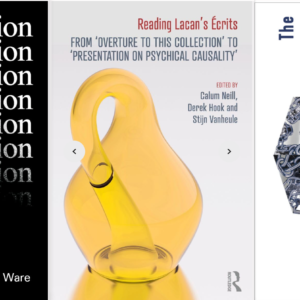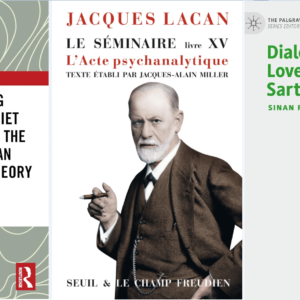News – August 2020
Want to receive this news via email each month? Sign up here.
20% off and free global shipping on all Routledge titles for LacanOnline.com readers. Use this link and code S031 at the checkout.
Starting with new book announcements, and Néstor A. Braunstein’s Jouissance: A Lacanian Concept was released by SUNY last month. The Argentine-Mexican analyst’s work offers an investigation of one of the most important but ill-defined terms in the Lacanian field, examining its application in philosophy, literature, gender, and queer studies as well as its usage in psychoanalysis. Originally published in Spanish in 1990, this new English language version follows translations into French and Portuguese, and having gone through multiple reprints in each language, this is a valuable edition to the Lacanian literature for English-speaking readers.
On the same topic, those able to read French might be interested to know that Darian Leader’s short book on the usage and mis-usage of the term jouissance has been translated into French under the title La jouissance, vraiment? and is due for release in France on 10th September. It is not currently available in English. Order it from Amazon France here if not available in your country.
Coming out at the end of September is Renata Salecl’s A Passion for Ignorance: What We Choose Not to Know and Why, published by Princeton University Press. Her book attempts to explain ignorance – whether active or passive, conscious or unconscious – with reference to how it plays out across domains as diverse as love, trauma, genetics, big data, and the incel movement. It is out on 29th September. In the meantime, you can watch Salecl discussing the subject in this 2012 talk in Zagreb on YouTube.
Newly-announced by Routledge last month for publication at the end of the year is Rosalinda Quintieri’s Dolls, Photography and the Late Lacan: Doubles Beyond the Uncanny. Quintieri examines visual culture and the continuing fascination of simulacra through an investigation of life-size dolls in European and American culture. Looking in particular at post-Oedipal aesthetics and subjectivity across different practices (photography, performance, sculpture, painting, documentary), and different genres (comedy, drama, fairy tale), the book looks like an exciting and original contribution to the Lacanian literature. A preview of the contents is on the publisher’s site, and as a reminder you can get 20% off and free global shipping by using the link and the code at the top of this page when ordering from the publisher.
Petra Čeferin’s The Resistant Object of Architecture: A Lacanian Perspective is also due out at the end of the year from Routledge. Arguing that the role of architecture is increasingly to serve global capital and that it is “becoming a constituent, complicit part of its mechanism”, Čeferin uses Lacanian theory to argue instead for the affirmative, transformative capacity of architecture.
Lastly from Routledge, Lacan and Critical Feminism: Subjectivity, Sexuation, and Discourse by Rahna McKey Carusi has been announced for release in December. Carusi uses Lacan’s work on sexuation and discourse theory from the late 1960s onward to explore women’s collective experience and action against the dominant societal narratives, drawing on examples from literature, film, art, and socio-political movements.
Finally among books, Robert K Beshara’s Freud and Said: Contrapuntal Psychoanalysis as Liberation Praxis will be released by Palgrave in January and is likely to be of interest to Lacanians. Examining the links between psychoanalysis, postcolonialsim, and decoloniality more broadly, Beshara’s argument attempts to ‘decolonise’ Freud and psychoanalyse Said. This book builds on Beshara’s previous work, 2019’s Decolonial Psychoanalysis, and both together are valuable additions to Critical Border Thinking and Lacanian Discourse Analysis.
Among newly-published papers of note, be sure to check out Antoni Grzybowski, Dariusz Grabowski & Miłosz Wujek’s paper in the latest edition of The International Journal of Psychoanalysis, Priority of the other: Psychosis through the lens of Laplanche’s general theory of seduction. It will be of interest to all Lacanians exploring the crucial questions around the development of psychosis, and provides a nice counterpoint to Lacan’s theory from one of his most talented contemporaries, Jean Laplanche. In particular, it highlights Laplanche’s divergence from Lacan on the former’s emphasis on ‘disavowal’/Verleugnung instead of Lacan’s favoured ‘foreclosure’/Verwerfung as the operative mechanism at play in psychosis. Well worth reading.
The New Lacanian School has published the Argument for the NLS Congress to be held 22nd-23rd May next year. ‘The Bodily Effects of Language’ is written by Alexandre Stevens and is a dense text which heavily references Miller’s ‘Lacanian Biology’, which in turn can be read as a commentary on Freud’s ‘Beyond the Pleasure Principle’ which – fittingly – is now in its centenary year. Stevens’ text itself outlines a distinction between two types of body – “the organism as real and the body as grasped in its unity as an image” – before exploring the concept of lalangue, the “idea that the signifier works not for signification but for satisfaction.” A distinction between the Freudian symptom and the symptom of the late Lacan is then discussed, with the example of Joyce drawn from Seminar XXIII discussed. The English translation of Stevens’ Argument is translated thanks to Philip Dravers.
Despite the announcement in the last few days of the cancellation of the XIIth Congress of the World Association of Psychoanalysis, which was due to be held in Buenos Aires in December, the WAP published plenty of preparatory material which is still worth reviewing. Among them, its newsletter ‘Papers 3: The Dream, a Treatment of the Trauma?’ was released in the last month. Nine papers are offered in English translation provided by the Action Committee of the School One [sic], and explore the dream and its interpretation, in line with the theme of the Congress. The next WAP Congress will be held in April 2022 in Paris. The theme is yet to be confirmed.
The School of the Freudian Letter UK will be running a webinar on 23rd September with psychoanalyst Petros Patounas titled ‘Das Ding: that which is Feminine.’ The presentation will touch upon themes and questions such as: what is the Thing? What place does it have in the psychoanalytic practice? and How is it associated with jouissance? Registration is free and the event will be held over Zoom.
Save the date for the PIPOL 10 European Congress of Psychoanalysis which been announced for 3rd-4th July 2021 in Brussels on the theme ‘Wanting a Child? Desire for Family and Clinic of Filiations.’ The poster announcing the Congress was released in the past month and the organising committee will be announcing more details soon. Keep an eye on the PIPOL English language site here for the latest updates.
The Irish Circle of the Lacanian Orientation (ICLO-NLS) will present its Opening Event for the 2020/21 Programme on Saturday 26th September. Veronique Voruz will discuss the question ‘How do we work with the speaking bodies of the subject of contemporary civilisation?’ Registration is €10 and the event will take place via Zoom.
In the US, Lacanian Compass has released its September 2020 program with reading seminars and clinical investigation seminars taking place remotely from locations across the US. Contact details for more information are available on the page above. The group’s annual meeting of its ‘Clinical Study Days’ is currently in preparation under the title ‘What Real at Stake?’ and the accompanying Argument is presented there too. The Clinical Study Days are open to anyone interested in psychoanalysis.
Lacan Salon has published its fall schedule, starting this September and running through to mid-December. The focus this year is Lacan’s Seminar IX. All sessions will take place via Zoom and are open to all. The Vancouver-based group also has a great selection of resources on its site and commentaries as part of its Listening with Black Lives Matter and Listening to COVID-19 series.
Lastly, it is with sadness that the death was announced last month of Gloria González, Lacan’s long-time secretary. An integral part of the Lacan household, her responsibilities extended far beyond managing Lacan’s diary. She was the first person Lacan’s patients saw when they came to see him, and from 1970 onward would take care of Lacan’s correspondence, manuscripts, and even supervise his bank account. She remained an honorary member of the ECF until her death last month. You can read a little more about Gloria – and her husband – here.
Got news? Get in touch.




Leave a Reply